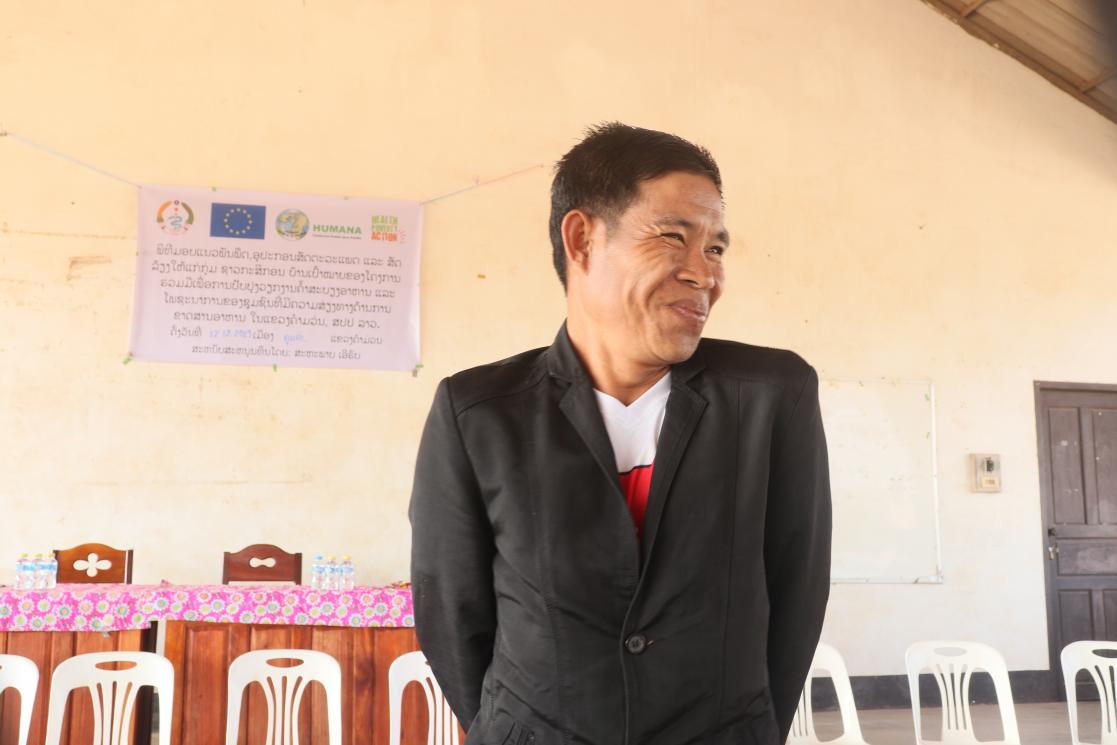Holistically improving access to better nutrition

Background of the project:
Khammuane Province has higher child mortality rates than the national average (138/1000 vs 89/1000) and high maternal and infant malnutrition. Approximately 34% of Children Under 5 are stunted. Especially remote and ethnic minority groups struggle to access health care, and poor environmental hygiene such as open defecation, use of contaminated water and unsafe storage practices further exacerbate malnutrition. With low agricultural productivity, rice monocultures and low diversification of food grown, communities lack a base for improved nutrition, a more balanced diet and higher incomes.
Objectives:
Output 1: The project seeks to increase the availability of and access to food with sufficient and essential nutrients. Beneficiaries are supported by Humana FPP to increase their productivity, diversify their crops, and improve their access to markets. Thus, families’ own nutrition as well as their income generation opportunities are strengthened.
Output 2: HPA aims to create an environment that is conducive to improved nutrition, targeting children, women, village authorities and health volunteers. Activities further community actors’ knowledge and understanding of underlying causes of malnutrition.
Output 3: All implementing partners cooperate to strengthen Province and District Nutrition Committees’ (PNC, DNC), Health Offices’ (PHO, DHO) and Agriculture and Forestry Offices’ (PAFO, DAFO) capacities on food and nutrition security, nutrition-sensitive interventions, multi-sector work plans, budgeting, and management information systems.
Results:
Output 1: Food security, resilience and dietary diversification in vulnerable communities is strengthened
Output 2: Increased community capacity to prevent, respond to and manage the wider determinants of malnutrition through improved nutrition, nutrition-sensitive and hygiene knowledge and practices amongst target communities
Output 3: Enhanced capacity of provincial and district level staff to lead multi-sectoral planning and improve coordination
Fact and Figures:
Output 1:
- 100 Farmers’ Clubs (FCs) have been established (50 farmers/FC) including management training for FC and village leaders
- Regular training for 5,000 farmers in climate-smart agricultural techniques has commenced (twice a month)
- 100 demonstration vegetable gardens are in the process of being established
- 32 villages’ irrigation systems were surveyed to prepare for instalment/improvement of irrigation
- 102 Village Veterinary Workers have been trained in livestock management and received veterinary kits
- 100 Village Development Committees and 100 Village Water Committees have been established, including training on nutrition and WASH
Output 2:
- 13,694 households and 109 schools in all 100 target villages were surveyed for WASH and village information
- 5,537 Children Under 5 received malnutrition screenings
- 1,121 pregnant and breastfeeding women as well as Children Under 5 were haemoglobin tested
- 45 health facilities received measuring and weighing equipment
- Cooking demonstrations were conducted in 100 target villages, including distribution of cooking equipment
- Data entry training was conducted with staff from 8 Health Centres
- 32 Women Groups and 32 Youth Peer Education and Community Youth Clubs have been established including nutrition and hygiene training
- Schools’ campaign on health, clean water, sanitation, hygiene and nutrition was conducted at 32 primary schools, including distribution of hygiene articles
- 100 water samples from 100 villages were taken for testing on E. coli. 42 wells which tested positive were treated and marked for observation
- 3 schools’ and 3 villages’ toilets, wells, boreholes and water tanks were surveyed and repaired/constructed
Output 3:
- 62 health authority and Health Centre staff received training on malnutrition
- 27 health and agriculture authorities’ staff received training on monitoring and evaluation
- 6 District Nutrition Committees’ capacities have been built
Website of the partners
Health Poverty Action (HPA): https://www.healthpovertyaction.org/
Humana Fundación Pueblo para Pueblo (Humana FPP): https://hpp-laos.org/
Khammuane Provincial Health Office (PHO)
Testimony

Mr Khampheng Phattana from Khounkham District strengthened his veterinary skills through Humana FPP’s trainings.
My name is Mr Khampheng Phatthana. I am 58 years old, work as a farmer and live in Ban Koub in Khounkham District. I love animals and like to take care of animals very much, so I became a Veterinary Volunteer in my village. My community selected me as a volunteer because they know how much I care about our animals’ health.
In July 2019, I attended a 4-day training by Humana FPP. I learned about vaccinations and basic livestock management. Now I feel much more confident to vaccinate animals. I can now also see that many farmers in my village would like to learn more about how to take good care of their animals. They come to me and ask for advice on vaccinations and other things. I am also very happy that I received a veterinary kit from the project. It includes medication, various equipment and a guidebook. I will use the kit to take care of all kinds of animals in our village, like cattle, chickens and ducks, goats and pigs.
Quote from the project coordinator

Ms Khamban Kephanit worked as a volunteer for the Provincial Agriculture and Forestry Office before joining Humana FPP. She uses her experience to support farmers in improving their production.
I can see that there are a lot of vulnerable people, and especially malnourished children, who can benefit from this project. I want these families to have access to good nutrition and to be healthy. I am very joyful that I can use my knowledge to work with people and to support them to improve their lives. I am giving my best.
